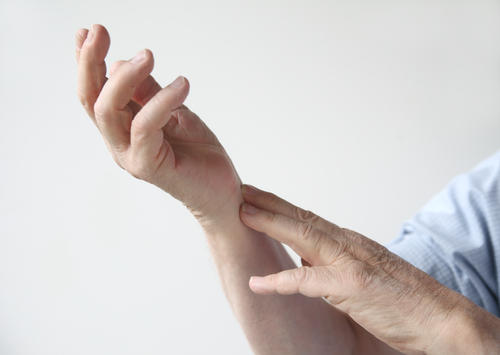Do you sometimes wake up and find your arms or hands falling asleep at night? This could be a frightening experience, and your discomfort is the same whether you have a complete or partial loss of sensation. When your arm or hand falls asleep it is so weak and you cannot grip or hold anything. Other annoying symptoms include pain, tingling, coldness, stiffness, or clumsiness. You may feel these symptoms in your fingers, wrists and palms, or they may extend to your arms.

Causes of Arms Falling Asleep at Night
What causes your arm or hand to fall asleep? These may explain your problem:
1. Wrong Sleeping Position
When you sleep on your hand or arm for a long time, your body exerts pressure on the hand/arm, which can disrupt the circulation and nerve pathways to that part of the body. The flow of blood is restricted when the arteries are compressed, which results in failure of the nerves in the arm to send proper signals to your brain. This disruption of nerve function can make your hands/arms fall asleep until blood flow improves.
2. Ulnar Nerve Entrapment
When your ulnar nerve, which runs from the neck down to the arm, gets compressed, it can make the hand/arm become numb. Keeping an elbow bent when sleeping can put pressure on your ulnar nerve and this can worsen nerve entrapment occurs. What causes ulnar nerve entrapment? It can be due to arthritis, cysts, fractures, or bone spurs which cause elbow swelling, leading to nerve entrapment.
3. Stroke
Approximately one out of seven strokes occurs at night while a patient is asleep, according to a study in the Neurology journal. A stroke results from a disruption of the blood flow to your brain. Numbness and tingling of the limbs on one side of the body, a headache, disorientation and difficulty speaking and understanding conversation are some of the symptoms of a stroke. If your arm and hand fall asleep, check for other symptoms of stroke and if they are present, call a doctor immediately.
4. Carpal Tunnel Syndrome
Inflammation of the median nerve, which passes through a narrow tunnel in the wrist, occurs when it is pressed during repetitive use of the hand and wrist. This results in loss of sensation or numbness of the fingers. Repetitive activities include playing the piano, typing, carpentry, painting, computer jobs, or racket sports.
5. Cubital Tunnel Syndrome
Inflammation of the ulnar nerve, which passes a tunnel in the elbow, gives a tingling sensation and numbness in the palm and little and ring fingers. This occurs when you bend the elbow for a long time, or when a traumatic injury in the elbow joint occurs.
6. Cervical Spondylosis
Degeneration of the cervical or neck joint occurs with aging. This causes a disk between the joints to herniate or protrude, compressing the nerve roots around the area. The result is numbness and weakness in the hands.
7. Other Causes
Several conditions may cause arms falling asleep at night, such as:
- Alcoholism
- Seizures
- Low temperatures
- Type 2 diabetes
- Raynaud's disease
- HIV/AIDS
- Transient ischemic attack
- Vitamin B-12 deficiency
- Spinal cord injury
- Amyloidosis
- Neck injury
- Enlarged blood vessels
- Tumors
- Broken shoulder blade
- Ganglion cysts
- Multiple sclerosis
- Lyme disease
- Sjogren's syndrome
- Vasculitis
- Syphilis
- Side effect of chemotherapy/radiation therapy
For a detailed explanation of the possible causes, watch this:
Treatments and Preventions of Arms Falling Asleep at Night
- Keep right sleeping position. Avoid placing your arm or hand below your head or any part of the body when sleeping. Avoid hanging your arm down the bed, since it can lead to tingling and numbness. Try to sleep in a different position.
- Keep moving when you sleep to avoid placing your arm/hand under any part of the body. Make sure your arm rests on the bed.
- Begin exercising such as walking, jogging or swimming daily to increase your blood circulation and reduce the risk of your arm falling asleep.
- Take breaks when performing work that requires repetitive movements like typing, clicking a computer mouse, knitting, or hammering. Rotate your shoulders and wrists occasionally.
- Alternate hot and cold water bath. To improve blood circulation immerse your arm/hand in hot or cold water or wrap the affected arm/hand with a hot or cold towel for relief.
- Take medications and injections as prescribed. Numbness and pain can occur together, and anti-inflammatory medicines may be taken for relief. For a patient who is suffering from severe continuous pain, corticosteroid injections may be administered to relieve pain and improve mobility. Blood circulation problems due to formation of small blood clots inside their blood vessels may be treated with medications to dissolve these clots. Drugs to reduce constriction of blood vessels may also be used. Doctors also suggest regularly massaging the hands to increase blood flow and improve the condition.
- Treat underlying causes such as peripheral neuropathy or pinched nerve. Treatment may include the use of pain relievers, antidepressants, and anti-seizure drugs. Diabetic patients must maintain normal blood sugar levels with proper diet and medications. Surgical treatment to relieve pressure on a pinched nerve may be an option.
- Manage your stress, which can lead to rapid breathing (hyperventilation) that may aggravate your symptoms. Consult a doctor for proper diagnosis and treatment of arms or hands falling asleep at night.
